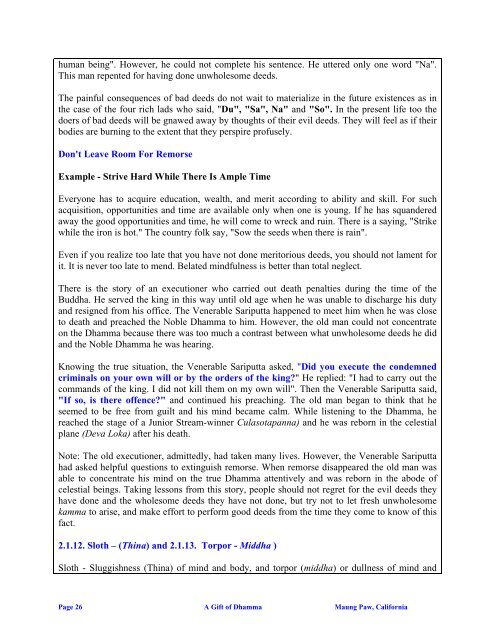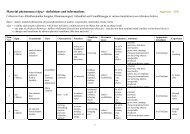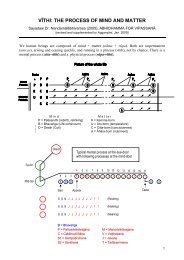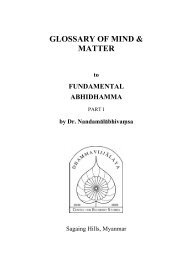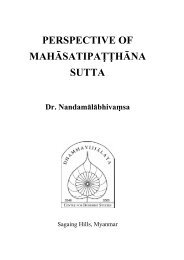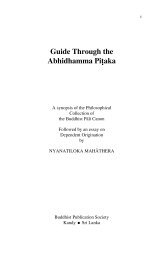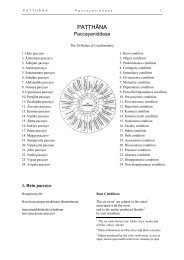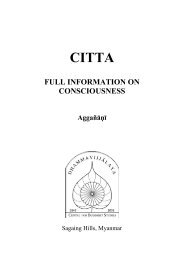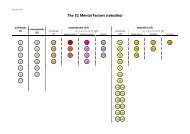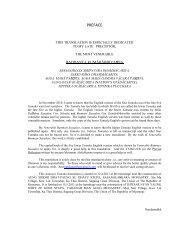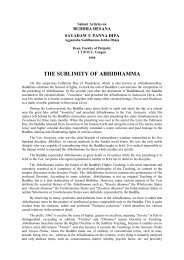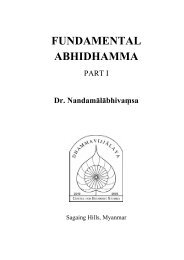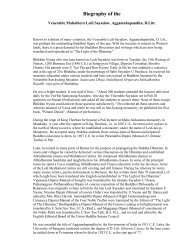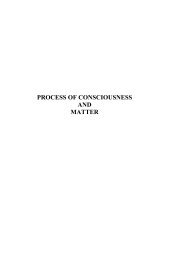ABHIDHAMMA IN DAILY LIFE - Abhidhamma.com
ABHIDHAMMA IN DAILY LIFE - Abhidhamma.com
ABHIDHAMMA IN DAILY LIFE - Abhidhamma.com
Create successful ePaper yourself
Turn your PDF publications into a flip-book with our unique Google optimized e-Paper software.
human being". However, he could not <strong>com</strong>plete his sentence. He uttered only one word "Na".<br />
This man repented for having done unwholesome deeds.<br />
The painful consequences of bad deeds do not wait to materialize in the future existences as in<br />
the case of the four rich lads who said, "Du", "Sa", Na" and "So". In the present life too the<br />
doers of bad deeds will be gnawed away by thoughts of their evil deeds. They will feel as if their<br />
bodies are burning to the extent that they perspire profusely.<br />
Don't Leave Room For Remorse<br />
Example - Strive Hard While There Is Ample Time<br />
Everyone has to acquire education, wealth, and merit according to ability and skill. For such<br />
acquisition, opportunities and time are available only when one is young. If he has squandered<br />
away the good opportunities and time, he will <strong>com</strong>e to wreck and ruin. There is a saying, "Strike<br />
while the iron is hot." The country folk say, "Sow the seeds when there is rain".<br />
Even if you realize too late that you have not done meritorious deeds, you should not lament for<br />
it. It is never too late to mend. Belated mindfulness is better than total neglect.<br />
There is the story of an executioner who carried out death penalties during the time of the<br />
Buddha. He served the king in this way until old age when he was unable to discharge his duty<br />
and resigned from his office. The Venerable Sariputta happened to meet him when he was close<br />
to death and preached the Noble Dhamma to him. However, the old man could not concentrate<br />
on the Dhamma because there was too much a contrast between what unwholesome deeds he did<br />
and the Noble Dhamma he was hearing.<br />
Knowing the true situation, the Venerable Sariputta asked, "Did you execute the condemned<br />
criminals on your own will or by the orders of the king" He replied: "I had to carry out the<br />
<strong>com</strong>mands of the king. I did not kill them on my own will". Then the Venerable Sariputta said,<br />
"If so, is there offence" and continued his preaching. The old man began to think that he<br />
seemed to be free from guilt and his mind became calm. While listening to the Dhamma, he<br />
reached the stage of a Junior Stream-winner Culasotapanna) and he was reborn in the celestial<br />
plane (Deva Loka) after his death.<br />
Note: The old executioner, admittedly, had taken many lives. However, the Venerable Sariputta<br />
had asked helpful questions to extinguish remorse. When remorse disappeared the old man was<br />
able to concentrate his mind on the true Dhamma attentively and was reborn in the abode of<br />
celestial beings. Taking lessons from this story, people should not regret for the evil deeds they<br />
have done and the wholesome deeds they have not done, but try not to let fresh unwholesome<br />
kamma to arise, and make effort to perform good deeds from the time they <strong>com</strong>e to know of this<br />
fact.<br />
2.1.12. Sloth – (Thina) and 2.1.13. Torpor - Middha )<br />
Sloth - Sluggishness (Thina) of mind and body, and torpor (middha) or dullness of mind and<br />
Page 26 A Gift of Dhamma Maung Paw, California


